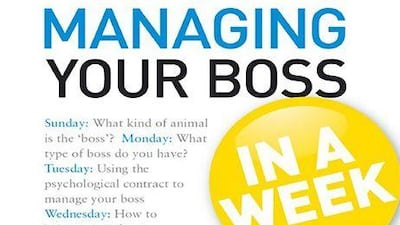"People don't quit their jobs," the saying goes. "They quit their bosses."
Indeed, failing to get along with one's boss can result in being passed up for promotion, constantly being assigned boring tasks and not getting credit for work. In a worst-case scenario, bad relations with a boss can result in chronic stress, acute anxiety and diminished self-esteem.
But with a little effort, employees can learn what makes their boss tick and work out how to meet his or her expectations, resulting, hopefully, in a fulfilling work life, says Sandi Mann, a senior lecturer in psychology at the University of Central Lancashire in the United Kingdom, in her book Managing Your Boss in a Week.
In this short book that can be finished in one sitting, Ms Mann explains how bosses spend their time and what kind of qualities they tend to have; how to work out the boss's leadership style and why it is astute to adjust one's behaviour accordingly; how to impress your boss and get more from him.
Helpfully, and this is the part that I skipped to immediately, there is a chapter on how to deal with the boss from hell. Like many books in this genre, a lot of the content seems like common sense, but there is always some nugget of wisdom that strikes a chord.
I particularly enjoyed the chapter on "using the psychological contract to manage your boss".
This is the unwritten contract you have with him about your job role. This covers communications, work updates, working patterns and levels of pro-activity.
So, for example, if you think the best way of communicating with your boss is phoning him, check that this won't disturb him; if you think it's best to have ad-hoc face-to-face chats, check that this doesn't make him feel hassled every time he goes for a cup of tea.
Likewise, in terms of working patterns, it's important to find a balance between working late, which will impress your boss, and working late too often, which may leave him with the impression of inefficiency.
And it's worth remembering that your boss doesn't have to like you. He just has to respect the job you do.

